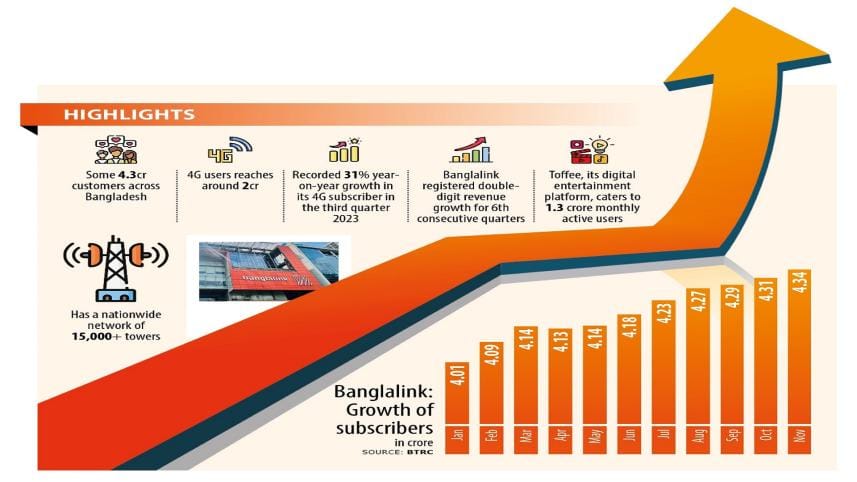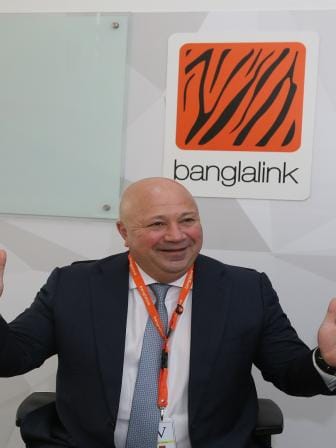Tax predictability, fresh mindset key to attracting foreign investment

Bangladesh must prioritise tax predictability and create an investor-friendly environment for infrastructure development to attract foreign investment in the country's telecom sector, boosting its ambitions for digitalisation in the process.
"I think Bangladesh is doing great in terms of developing its economy, but the more predictable its tax system can be, the better for foreign investors like us," Kaan Terzioğlu, group CEO of Banglalink's parent company VEON, told The Daily Star in a recent interview.
Terzioğlu believes it is very important for the government and private companies to focus on accelerating growth in the telecom industry while also expanding mobile internet usage.
"There is no way to catch up with our digitalisation goals if fibarisation is lagging, if mobile internet is not accessible by everyone, and if the required investments are not deployed by private firms."
"But in return, we want tax predictability and less burden on investments. So, I think this is the dialogue we must focus on."
His remark comes at a juncture when the taxes and fees levied on the local telecom sector are more than double the Asia Pacific average, according to a GSMA report published last year.
He said telecom companies in Bangladesh have been demanding permission to lay fibre optic cables for a long time.
Unlike many other countries, local telecom operators are unable to lay fibre optic cables. Therefore, they must depend on third parties for the infrastructure essential for delivering faster internet.
"We have to make it easy for investors to invest, we have to make it easy for digging down and laying fibre, and we have to make it easy to share each other's infrastructure to reach more people," Terzioğlu said.
"If we have a fresh mindset about how we can make it easy for private investors to come and build infrastructure with their own money, I think you will find a lot of solutions."
According to him, an emphasis on developing a "Smart" and "Digital" Bangladesh is the only way forward to an equitable and prosperous future for the country.
"I see that mobile internet access in the country is growing but I believe '4G for all' -- the vision that we initiated at Banglalink -- still needs a lot of work."
"We have to work together with government authorities, and as an industry at large, support each other and make sure we don't waste important resources."
He thinks it is also necessary to share networks and towers and contribute to the fiberisation of the country and deploy 4G at every corner of the country.
"It is important to understand that investing in telecommunications requires a lot of funding, which they do not expect to receive from the government. But we have to create enough profitability to make sure that we can invest in the future of internet infrastructure in Bangladesh. I think we have a lot of homework to do in this regard."
Terzioğlu's visit to Bangladesh coincided with Banglalink's stellar performance in recent months.
Banglalink achieved a 31 percent year-on-year growth in its 4G subscriber base in the third quarter of 2023, totalling around 20 million subscribers.
With double-digit revenue growth for six consecutive quarters, the company's revenue soared 15 percent to Tk 1,588 crore.
It also won the seventh consecutive Ookla Speedtest Award in four years.
Asked about the strategy that contributed to Banglalink's accomplishments, Terzioğlu attributed the company's success to its "4G for all" vision.

"You remember that almost two years ago, we made important decisions. We said the quality of service that Banglalink can bring to certain limited markets from now on will be available throughout Bangladesh, and we decided to start executing our '4G for all' vision."
"During the two years, we literally doubled our network footprint. And we brought high-speed mobile internet, not to a limited number of regions, but to the entirety of the nation."
Banglalink has ambitions not just to become the best telecom company in Bangladesh, but also the best entertainment, education, healthcare, and financial services platform, the CEO said.
"The more financial inclusion the company can create among the population, the more spread out its tax base will be. But these will require further digitalisation of the economy."
"Today, I see that just 3 million people on the tax registry are paying taxes while maybe 10 million people are registered. These numbers need to grow and there is only one way to do so. It is the digitalisation of the economy."
Banglalink is currently contending with regulatory challenges, specifically concerning an audit directed by the Bangladesh Telecommunication Regulatory Commission (BTRC), mandating the clearance of dues amounting to about Tk 820 crore.
Notably, over half of this amount comprises late fees, a matter to which Banglalink has raised objections. Meanwhile, the operator has already paid the principal amount of the claim.
Terzioğlu said he considers audits from regulatory bodies as a healthy system, but they need to be done in a timely manner.
In 2021, Banglalink underwent an audit, which covered its operations from 1996 to 2019, with the final report delivered earlier this year.
The audit should have been conducted regularly, the group CEO said.
Following the audit, the company was asked to pay late fees covering 25 years.
"We should not be asked for the late fees of 25 years for the mistakes that could have been identified 25 years ago. That was our request to the authorities, and I think we have a fair request in that regard," he added.
Last month, Banglalink announced the sale of 2,000 of its towers to Summit Towers Ltd, a company of Summit Communications Group.
Asked if the audit claim of the regulator prompted Banglalink's decision to sell the towers, Terzioğlu said he believes towers should be owned by independent tower companies as they possess superior expertise in their management.
"We sold off a third of our towers. And you will see that in the future, we will continue doing that. Why do we do that? We believe we have to invest. And those funds that we generate from tower sales will be invested in digital services."
He also said the company is continuously assessing the right time to go public in Bangladesh.
"We believe the upcoming election is important because after that, the market will have more visibility and we will continue exploring that opportunity."
According to Terzioğlu, the BTRC's directive to discontinue the popular three-day data package, chosen by most customers, cost Banglalink a 5 percent reduction in revenue.
"If we lose 5 percent of the revenue, the government loses 5 percent taxes. Is this a good thing? I don't think so."
Terzioğlu, a Turkish national, assumed the role of CEO for VEON Group in June 2021, overseeing operations in six markets.
He navigated the company through its most challenging period during the Russia-Ukraine war. Under his leadership, VEON successfully closed the sale of its Russia operations, marking the completion of the company's exit from Russia, its most profitable market.
"On the first day of the war, we found ourselves in a very difficult position because two of our largest markets started a war between themselves," he said.
"We then had to make a choice as you cannot serve both countries at the same time, and we chose Ukraine."
However, he acknowledged that it was not an easy decision as VEON was originally established in Russia.
Unlike other CEOs of telecom groups, Terzioğlu often visits Bangladesh.
"Every time I come to Bangladesh, I see significant development. I mean, last time I was here, I had the chance to see the Padma Bridge and this time I saw the elevated expressway and the new airport terminal."
"I think these are all signs of Bangladesh consistently moving forward, developing its economy, and creating prosperity for its people."



 For all latest news, follow The Daily Star's Google News channel.
For all latest news, follow The Daily Star's Google News channel.
Comments